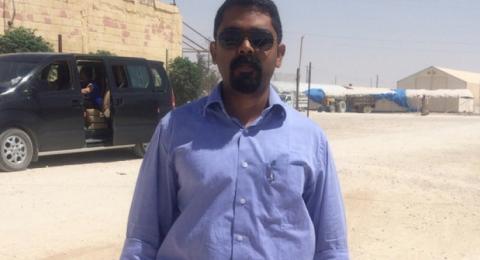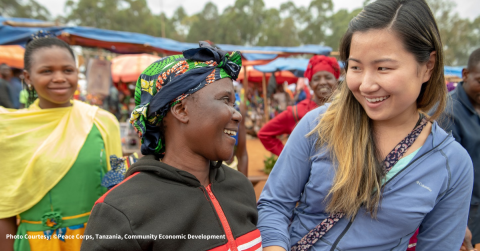The Carsey School’s Master of Global Conflict and Human Security (GCHS) online program will prepare you for a role in humanitarian relief and global development solving the world's most pressing problems. Join our online cohort in the fall or spring and complete your degree in just 12 months. Highly sought after, the GCHS program is partners with the Peace Corps to support Returned Peace Corps Volunteers with the Coverdell Fellowship.
Application Deadlines: Apr. 15 (Summer Term) ● Aug. 1 (Fall Term) ● Dec. 15 (Spring Term)
- 100% Online
- 30 Credit Hours
- 12 Months
- No GRE Required
- Tuition Cost
Why get a master’s degree in global conflict & human security?
The world’s most vulnerable communities are in fragile and conflict-affected states. Our transdisciplinary program cultivates a deep understanding of the drivers of violent conflict and the myriad challenges facing people in fragile states—from food scarcity to environmental degradation to terrorism. You will learn how to assess risk and threats to human security and promote social, economic and political development while building durable peace. GCHS prepares you for a career in the nonprofit, public or private sector.
Why choose UNH’s Master of GCHS program?
You will sharpen your problem-solving skills and learn strategies for enhancing human security through project-based courses taught by researchers and practitioners with decades of field experience. Are you interested in addressing gender-based violence? Countering violent extremism? Mitigating the effects of climate change? Developing humanitarian response plans? Design, implement and evaluate a project based on your interests. Build essential skills in data collection and analysis as well as project monitoring and evaluation (M&E) for a career as a program manager, a fast-growing profession in the global development field. All courses are delivered 100% online during eight-week e-terms—ideal for working professionals. Our online courses are taught by the same full-time faculty who also teach our on-campus courses. This means you are getting the same education online as you would on campus.
Potential careers
- Program Manager
- Foreign aid specialist
- Foreign service officer
- Humanitarian aid worker
- International consultant
- International development specialist
- Monitoring & evaluation officer
- Policy analyst
- Risk analyst
- Social enterprise specialist
- Social policy manager
Featured Alumni
Andrew Szparaga '24G

Monitoring & Evaluation Specialist
U.S. Department of Justice
Andrew used his GCHS degree to rise from Peace Corps volunteer to federal M&E Specialist.
Kristy Miyashita '25G

Clinical Trials Nurse
Memorial Sloan Kettering
Kristy used her GCHS degree to use her nursing background in a global security setting.
Maria Daneault '22G

Emergency Management Technician
United States Air Force
Maria used her GCHS degree to advance from emergency management intern to Air Force technician.
Curriculum & Requirements
The United Nations delineates seven issues related to human welfare that fall under its human security framework: economic security, food security, health security, environmental security, personal security, community security, and political security. Violent conflict threatens all of these. This unique Global Conflict and Human Security online master's degree program (GCHS) reflects global discussions about the UN Sustainable Development Goals and a humanitarian-development-peace nexus as an approach for creating holistic programs that address chronic threats to human security, such as poverty and civil unrest, and contribute to social harmony and peace.
The Online GCHS program offers you the opportunity to acquire skills in international development policy and practice to build resilient communities in places affected by humanitarian crises. This includes all aspects of program design, monitoring and evaluation, peace building, and policy analysis.
Our GCHS program is a ten course, thirty-credit program that students can complete in just one year, or two years with part-time enrollment.
- The GCHS program is fully online and is ideal for working professionals
- Study with international development practitioners and faculty who bring strong analysis and best practices to your learning
- Start in the fall, spring, or summer and graduate in as little as 12 months of full-time participation
- Choose the Project Management Track to learn best practices in project design, implementation, monitoring, and evaluation or the Policy & Administration Track to hone your skills in public policy analysis, program evaluation, and public administration.
- The GRE is not required to apply for this degree program
Program Delivery & Location: Core academic courses for the GCHS program are offered entirely online with choices for taking optional elective courses in person on the UNH campuses. Students who choose to participate in the Washington DC Colloquium experience will join students from other Carsey programs for a week in Washington, DC.
PROJECT MANAGEMENT Track (Full Time)
| First Year | ||
|---|---|---|
| Fall | Credits | |
| Term 1 | ||
| GCHS 810 | Conflict & Human Security | 3 |
| DPP 980 | Introduction to Community Development Projects | 3 |
| Term 2 | ||
| GCHS 830 | International Development & Human Security | 3 |
| DPP 981 | Project Design and Planning | 3 |
| Credits | 12 | |
| Spring | ||
| Term 3 | ||
| GCHS 820 | Global Governance | 3 |
| DPP 982 | Project Implementation and Monitoring | 3 |
| Term 4 | ||
| GCHS 850 | Peace and Human Security in the Post-Atrocity State | 3 |
| DPP 983 | Project Evaluation | 3 |
| Credits | 12 | |
| Summer | ||
| Term 5 | ||
| GCHS 840 | Sustainable Development: Gender-Environment Nexus | 3 |
| GCHS-Approved Elective Course | 3 | |
| Credits | 6 | |
| Total Credits | 30 | |
.
POLICY & ADMINISTRATION Track (Full Time)
| First Year | ||
|---|---|---|
| Fall | Credits | |
| Term 1 | ||
| GCHS 810 | Conflict & Human Security | 3 |
| DPP 980 | Introduction to Community Development Projects | 3 |
| Term 2 | ||
| GCHS 830 | International Development & Human Security | 3 |
| DPP 981 | Project Design and Planning | 3 |
| Credits | 12 | |
| Spring | ||
| Term 3 | ||
| GCHS 820 | Global Governance | 3 |
| PA 804 | Policy and Program Evaluation | 3 |
| Term 4 | ||
| GCHS 850 | Peace and Human Security in the Post-Atrocity State | 3 |
| PA 908A | Capstone in Public Administration | 3 |
| Credits | 12 | |
| Summer | ||
| Term 5 | ||
| GCHS 840 | Sustainable Development: Gender-Environment Nexus | 3 |
| GCHS-Approved Elective Course | 3 | |
| Credits | 6 | |
| Total Credits | 30 | |
The non-thesis MS degree can be completed in one year of full time participation. Students must complete ten courses totaling thirty credits to graduate. All courses are offered online. Students must choose ONE of the following tracks in Project Management or Policy & Administration.
PROJECT MANAGEMENT Track
| Code | Title | Credits |
|---|---|---|
| BASIC Core Curriculum Courses (2 Courses) | ||
| GCHS 810 | Conflict & Human Security | 3 |
| GCHS 820 | Global Governance | 3 |
| ADVANCED Core Curriculum Courses (3 Courses) | ||
| GCHS 830 | International Development & Human Security | 3 |
| GCHS 840 | Sustainable Development: Gender-Environment Nexus | 3 |
| GCHS 850 | Peace and Human Security in the Post-Atrocity State | 3 |
| EXPERIENTIAL LEARNING Courses (4 Courses) 2 | ||
| DPP 980 | Introduction to Community Development Projects | 3 |
| DPP 981 | Project Design and Planning | 3 |
| DPP 982 | Project Implementation and Monitoring | 3 |
| DPP 983 | Project Evaluation | 3 |
| ELECTIVE Courses (1 Course) | ||
| GCHS-Approved Elective Course 1 | 3 | |
| Total Credits | 30 | |
.POLICY & ADMINISTRATION Track
| Code | Title | Credits |
|---|---|---|
| BASIC Core Curriculum Courses (3 Courses) | ||
| GCHS 810 | Conflict & Human Security | 3 |
| GCHS 820 | Global Governance | 3 |
| PA 908A | Capstone in Public Administration | 3 |
| ADVANCED Core Curriculum Courses (3 Courses) | ||
| GCHS 830 | International Development & Human Security | 3 |
| GCHS 840 | Sustainable Development: Gender-Environment Nexus | 3 |
| GCHS 850 | Peace and Human Security in the Post-Atrocity State | 3 |
| EXPERIENTIAL LEARNING Courses (3 Courses) | ||
| DPP 980 | Introduction to Community Development Projects | 3 |
| DPP 981 | Project Design and Planning | 3 |
| PA 804 | Policy and Program Evaluation | 3 |
| ELECTIVE Courses (1 Course) | ||
| GCHS-Approved Elective Course 1 | 3 | |
| Total Credits | 30 | |
- 1
Students should consult with their Graduate Academic Advisor for guidance on available elective courses relevant to their interests.
- 2
With full faculty support, students carry out a four-term capstone project in their communities by completing actionable assignments throughout the series of four (4) applied project courses.
Accelerated Master's Overview
Accelerated Master’s programs offer qualified University of New Hampshire undergraduate students the opportunity to begin graduate coursework in select graduate programs while completing a bachelor’s degree. Accelerated master's programs are designed to provide students with an efficient and cost-effective pathway to earn both a bachelor's and master's degree or graduate certificate, enhancing career opportunities and long-term earning potential.
Accelerated Master's Highlights
- Begin studying advanced topics while an undergraduate student with the opportunity to complete a master’s degree or graduate certificate early.
- Master’s degree program students: Earn up to 12* graduate (800-level) course credits while completing a bachelor’s degree. This coursework will count as dual-credit toward both the bachelor’s and master’s degrees.
- Graduate certificate program students: Earn up to 8* graduate (800-level) course credits while completing a bachelor’s degree. This coursework will count as dual-credit toward both the bachelor’s degree and the graduate certificate.
- Students complete the bachelor’s degree, and then officially matriculate into the master’s or graduate certificate program to complete the remaining required graduate-level coursework.
*Some exceptions apply.
Accelerated Master's Admission Requirements
- A minimum 3.2 cumulative GPA is required.*
- A minimum of 90 undergraduate credits must be completed prior to enrolling in graduate (800-level) courses.
- Streamlined Graduate School Application (two letters of recommendation; most standardized tests and application fee are waived).*
*Some exceptions apply.
Accelerated Master's Requirements
- Students must attend a mandatory orientation session.
- Students must submit a special registration form each semester for dual-credit courses and note any DegreeWorks exceptions.
- Students may defer graduate matriculation for up to one year after earning their bachelor’s degree in most programs.
- See the Accelerated Master’s Catalog Policy and Accelerated Master’s Website for additional information and a list of programs. Note that some programs have additional requirements (e.g. higher-grade expectations) compared to the general policy.
Global Conflict and Human Security (M.S.) Accelerated Option
This graduate degree program is approved to be taken on an accelerated basis in articulation with the following undergraduate program(s):
College of Health and Human Services
| Code | Title | Credits |
|---|---|---|
| Recreation Management & Policy: Outdoor Leadership and Management (B.S.) | ||
| Recreation Management & Policy: Program and Event Management (B.S.) | ||
| Recreation Management & Policy: Therapeutic Recreation (B.S.) | ||
| Students select up to four (4) courses (12 credits total) from the following approved 800-level courses: | ||
Community Development Policy and Practice (M.A.) courses: | ||
DPP 801 | Integrative Approaches to Development Policy and Practice | |
DPP 802 | Economic Analysis for Development | |
DPP 805 | Fiscal Management for Development Organizations | |
DPP 806 | Organizational Management and Leadership | |
Global Conflict & Human Security (M.S.) courses: | ||
GCHS 810 | Conflict & Human Security | |
GCHS 820 | Global Governance | |
GCHS 830 | International Development & Human Security | |
GCHS 840 | Sustainable Development: Gender-Environment Nexus | |
GCHS 850 | Peace and Human Security in the Post-Atrocity State | |
Public Administration (M.P.A.) courses: | ||
PA 800 | Foundations and Theories of Public Administration | |
PA 802 | Grant-writing for Public and Non-profit Sectors | |
PA 809 | Organization and Management in Public and Non-profit Sectors | |
PA 812 | Leadership Theory and Practice | |
PA 818 | Non-Profit Management | |
PA 819 | Managing Conflict and Change in Nonprofit and Public Organizations | |
PA 820 | Strategic Communications for Public and Non-profit Sectors | |
PA 821 | Effective Change Management in Nonprofit and Public Organizations | |
Public Policy (M.P.P.) courses: | ||
PPOL 806 | Fundamentals of Policy Analysis | |
PPOL 810 | Policy Across Borders | |
PPOL 812 | Strategies for Policy Impact | |
PPOL 822 | Media Strategy and Skills | |
PPOL 897 | Advanced Special Topics | |
Recreation Management and Policy (M.S.) courses: | ||
RMP 811 | Recreation Resource Management | |
RMP 820 | Adaptive Sport Facilitation for Recreation Therapy and Related Professions | |
RMP 824 | Research, Evaluation, and Data-Driven Decisions | |
RMP 840 | Therapeutic Recreation Service Delivery in Community Settings | |
RMP 868 | Theories and Philosophies of Youth Development | |
RMP 872 | Law and Public Policy in Leisure Services | |
RMP 876 | Human Dimensions of Natural Environments | |
College of Professional Studies - Manchester
| Code | Title | Credits |
|---|---|---|
| Global Studies (Minor) | ||
| 800-level courses approved for the undergraduate program: | ||
GCHS 810 | Conflict & Human Security | |
GCHS 820 | Global Governance | |
GCHS 830 | International Development & Human Security | |
GCHS 840 | Sustainable Development: Gender-Environment Nexus | |
| Code | Title | Credits |
|---|---|---|
| Terrorism Studies (Minor) | ||
| 800-level courses approved for the undergraduate program: | ||
GCHS 810 | Conflict & Human Security | |
GCHS 830 | International Development & Human Security | |
College of professional studies - online
| Code | Title | Credits |
|---|---|---|
| Business and Technology | ||
Accounting and Finance (B.S.) | ||
Applied Studies: Management (B.S.) | ||
Business Management: Accounting Option (B.S.) | ||
Business Management: Economic Science Option (B.S.) | ||
Business Management: Emergency Management Strategy and Planning Option (B.S.) | ||
Business Management: Finance Option (B.S.) | ||
Business Management: Leadership, Change, and Social Responsibility Option (B.S.) | ||
Business Management: Management Option (B.S.) | ||
Business Management: Nonprofit Management Option (B.S.) | ||
Business Management: Organization and Business Administration Option (B.S.) | ||
Business Management: Project Management Option (B.S.) | ||
Fire Service Administration (B.S.) | ||
Human Resource Management (B.S.) | ||
Operations, Supply Chain, and Logistics Management (B.S.) | ||
Public Administration (B.S.) | ||
Technology Management (B.S.) | ||
| Health Care, Human Services, and Behavioral Science | ||
Applied Psychology: Emergency Management Strategy and Planning Option (B.S.) | ||
Criminal Justice (B.S.) | ||
| Liberal Arts, Communications, and General Education | ||
Individualized Studies: Management (B.S.) | ||
Professional Communication: Business and Strategic Communication Option (B.S.) | ||
Professional Communication: Interpersonal and Organizational Communication Option (B.S.) | ||
Professional Communication: Visual Communication and Social Media Option (B.S.) | ||
| The approved 800-level courses below will count as electives in the undergraduate program. | ||
| Students may select up to four (4) 800-level courses (12 credits total) from the following: | ||
Community Development Policy and Practice (M.A.) courses: | ||
DPP 801 | Integrative Approaches to Development Policy and Practice | |
DPP 802 | Economic Analysis for Development | |
DPP 805 | Fiscal Management for Development Organizations | |
DPP 806 | Organizational Management and Leadership | |
Global Conflict & Human Security (M.S.) courses: | ||
GCHS 810 | Conflict & Human Security | |
GCHS 820 | Global Governance | |
GCHS 830 | International Development & Human Security | |
GCHS 840 | Sustainable Development: Gender-Environment Nexus | |
GCHS 850 | Peace and Human Security in the Post-Atrocity State | |
Public Administration (M.P.A.) courses: | ||
PA 800 | Foundations and Theories of Public Administration | |
PA 802 | Grant-writing for Public and Non-profit Sectors | |
PA 809 | Organization and Management in Public and Non-profit Sectors | |
PA 812 | Leadership Theory and Practice | |
PA 818 | Non-Profit Management | |
PA 819 | Managing Conflict and Change in Nonprofit and Public Organizations | |
PA 820 | Strategic Communications for Public and Non-profit Sectors | |
PA 821 | Effective Change Management in Nonprofit and Public Organizations | |
Public Policy (M.P.P.) courses: | ||
PPOL 806 | Fundamentals of Policy Analysis | |
PPOL 810 | Policy Across Borders | |
PPOL 812 | Strategies for Policy Impact | |
PPOL 822 | Media Strategy and Skills | |
PPOL 897 | Advanced Special Topics | |
Program Learning Outcomes
Upon completion of the MS in Global Conflict and Human Security, students will be able to:
- Explain competing schools of thought on relevant issues in key disciplines (for ex., peace and conflict studies, international development studies)
- Conduct conflict analyses and develop policy recommendations
- Conduct needs assessments and analyze the interrelatedness of distinct human security domains (economic security, food security, health security environmental security, personal security, community security, and political security)
- Apply theory to practice by designing humanitarian, development, and/or peacebuilding programs
- Collect data and perform data analysis using qualitative and quantitative methodologies
- Implement a development program (if applicable)
- Evaluate the impact and effectiveness of humanitarian, development and/or peacebuilding programs
- Communicate professionally and effectively across different cultures and social groups.
Deadlines
Applications must be completed by the following deadlines in order to be reviewed for admission:
- Fall: August 1
- Spring: December 15 (Deadline extended to January 3 for Spring 2025)
- Summer: April 15
- Special: N/A
Application fee: $65
Campus: Online
New England Regional: Not Needed
Accelerated Masters: Yes (for more details see the accelerated masters information page)
New Hampshire Residents
Students claiming in-state residency must also submit a Proof of Residence Form. This form is not required to complete your application, but you will need to submit it after you are offered admission, or you will not be able to register for classes.
Transcripts
If you attended UNH or Granite State College (GSC) after September 1, 1991, and have indicated so on your online application, we will retrieve your transcript internally; this includes UNH-Durham, UNH-Manchester, UNH Non-Degree work and GSC.
If you did not attend UNH, or attended prior to September 1, 1991, then you must upload a copy (PDF) of your transcript in the application form. International transcripts must be translated into English.
If admitted, you must then request an official transcript be sent directly to our office from the Registrar's Office of each college/university attended. We accept transcripts both electronically and in hard copy:
- Electronic Transcripts: Please have your institution send the transcript directly to grad.school@unh.edu. Please note that we can only accept copies sent directly from the institution.
- Paper Transcripts: Please send hard copies of transcripts to: UNH Graduate School, Thompson Hall- 105 Main Street, Durham, NH 03824. You may request transcripts be sent to us directly from the institution or you may send them yourself as long as they remain sealed in the original university envelope.
Transcripts from all previous post-secondary institutions must be submitted and applicants must disclose any previous academic or disciplinary sanctions that resulted in their temporary or permanent separation from a previous post-secondary institution. If it is found that previous academic or disciplinary separations were not disclosed, applicants may face denial and admitted students may face dismissal from their academic program.
Letters of Recommendation: 2 Required
Recommendation letters submitted by relatives or friends, as well as letters older than one year, will not be accepted.
Resume
A current resume is required with your submitted application.
Personal Statement/Essay Questions
Prepare a brief but careful statement regarding:
- Reasons you wish to do graduate work in this field, including your immediate and long-range objectives.
- Your specific research or professional interest and experiences in this field.
Important Notes
All applicants are encouraged to contact programs directly to discuss program-specific application questions.
GRE Optional
The GRE scores are optional, if you wish to provide scores please email the scores directly to the department once you have submitted your application online.
International Applicants
Prospective international students are required to submit TOEFL, IELTS, or equivalent examination scores. English Language Exams may be waived if English is your first language. If you wish to request a waiver, then please visit our Test Scores webpage for more information.
Application
Can I complete the GCHS program on a part-time basis?
Our Online GCHS program is designed so the full-time working professional can take classes on a part-time basis. Classes are conducted online and typically consist of an asynchronous curriculum combined with a small number of synchronous sessions over the term which, if offered, are held in the early evenings.
Is the GRE required?
The GRE is not required but can be submitted, if desired.
Can I take a "test drive" before applying?
Yes. If you are unsure whether the Online GCHS program is a good fit, you are welcome to sit in on a class or take a GCHS course prior to matriculating into the program. Contact the Team
Financial Aid
Federal Unsubsidized Direct Loans are a form of federal aid available to Graduate Students. To apply, you must complete the Free Application for Federal Student Aid (FAFSA).
Additional Financial Aid Information
Does this program offer any Scholarships?
The Carsey School of Public Policy offers a limited number of needs-based partial tuition scholarships to students who have submitted their online application and been accepted into the program. In order to be considered for a Carsey School Scholarship, please complete and submit your Online Scholarship Application Form. Applicants will be notified if they qualify for an award within two to three weeks after submitting a completed application. We also encourage students who are awarded a scholarship to leverage their award by seeking additional funding opportunities from other sources. Submit a Scholarship Application
What happens to my Carsey Scholarship award if I need to defer?
Carsey Scholarships based on financial need are considered and awarded to individuals for the program year of application. If an admitted student who has been awarded a Carsey Scholarship needs to defer their start date due to financial reasons, their scholarship application will also be deferred and given priority reconsideration for the new program start date.
What alternative funding opportunities are available?
We strongly encourage you to look into other outside scholarship opportunities. Domestic students are eligible for both private and federal loans. More detailed information can be found on the UNH Grad School’s Financial Aid webpage or at Tuition Management System.












